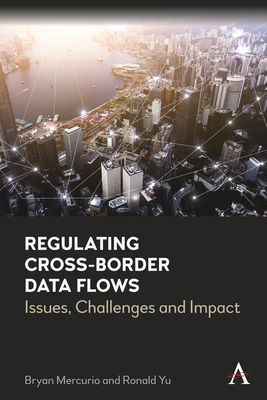Regulating Cross-Border Data Flows: Issues, Challenges and Impact

Regulating Cross-Border Data Flows: Issues, Challenges and Impact
The adoption of data-driven applications across economic sectors has made data and the flow of data so pervasive that it has become integral to everything we as members of society do - from conducting our finances to operating businesses to powering the apps we use every day. Flows of knowledge and technology are at the centre of new networks driving production and innovation. The increasing use of the Internet of Things (IoT), and the growing amount of data generated, are driving substantial opportunities. Data is now one of the world's most valuable resources, and its flow across borders is the lifeblood of the global internet economy. Data has already significantly impacted various industrial sectors - e.g. trade, banking and finance, telecommunications, media/entertainment and healthcare - and the global economy overall.
Governing cross-border data flows is inherently difficult given the ubiquity and value of data, and the impact government policies can have on national competitiveness, business attractiveness and personal rights. The challenge for governments is to address in a coherent manner the broad range of data-related issues in the context of a global data-driven economy. While larger economies such as the US, EU and China have clear policies and overarching objectives in place, many smaller jurisdictions have yet to adopt a strategy or framework. This is regrettable, as it is imperative that all jurisdictions have a clear strategy on cross-border data which is designed to meet the opportunities and challenges of the digital transformation. Instead, many jurisdictions currently operate on a "by default" combination of piecemeal legislation and obligations undertaken in free trade agreements.
This book engages with the unexplored topic of why and how governments should develop a coherent and consistent framework regulating cross-border data flows. The objective is to fill a very significant gap in the legal and policy setting by considering multiple perspectives in order to assist in the development of a jurisdiction's coherent policy framework.
PRP: 225.99 Lei
Acesta este Prețul Recomandat de Producător. Prețul de vânzare al produsului este afișat mai jos.
180.79Lei
180.79Lei
225.99 LeiIndisponibil
Descrierea produsului
The adoption of data-driven applications across economic sectors has made data and the flow of data so pervasive that it has become integral to everything we as members of society do - from conducting our finances to operating businesses to powering the apps we use every day. Flows of knowledge and technology are at the centre of new networks driving production and innovation. The increasing use of the Internet of Things (IoT), and the growing amount of data generated, are driving substantial opportunities. Data is now one of the world's most valuable resources, and its flow across borders is the lifeblood of the global internet economy. Data has already significantly impacted various industrial sectors - e.g. trade, banking and finance, telecommunications, media/entertainment and healthcare - and the global economy overall.
Governing cross-border data flows is inherently difficult given the ubiquity and value of data, and the impact government policies can have on national competitiveness, business attractiveness and personal rights. The challenge for governments is to address in a coherent manner the broad range of data-related issues in the context of a global data-driven economy. While larger economies such as the US, EU and China have clear policies and overarching objectives in place, many smaller jurisdictions have yet to adopt a strategy or framework. This is regrettable, as it is imperative that all jurisdictions have a clear strategy on cross-border data which is designed to meet the opportunities and challenges of the digital transformation. Instead, many jurisdictions currently operate on a "by default" combination of piecemeal legislation and obligations undertaken in free trade agreements.
This book engages with the unexplored topic of why and how governments should develop a coherent and consistent framework regulating cross-border data flows. The objective is to fill a very significant gap in the legal and policy setting by considering multiple perspectives in order to assist in the development of a jurisdiction's coherent policy framework.
Detaliile produsului










